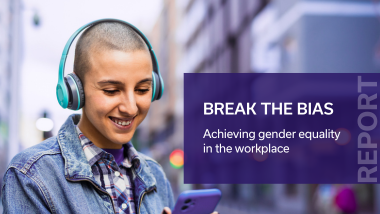Why allyship benefits everyone in the workplace
Gender equality movements, in the workplace and beyond, are often associated with women – even by male colleagues who consider themselves to be active and enthusiastic feminists. This inclination is understandable. It should go without saying that women have historically been most affected by gender inequality, and continue to face dramatic and highly visible disparities, particularly the gender pay gap.
The desire to help shape a fair and inclusive workplace environment should be reason enough for men to support their female colleagues, and for many, this is the sole motivation behind their involvement in the cause. Yet men may also be unaware that gender-equal workplaces and societies can actually benefit everyone. Encouraging a more widespread understanding of these benefits could be the key to persuading more men to join the frontlines of the gender equality movement.
Equality for all
The notion that advancing women’s rights will encroach on those of men is a baseless concern. According to a 2018 report by the World Health Organisation comparing 41 European countries, men’s health tends to be poorer in societies that have higher rates of gender inequality. The same research found that men living in more gender-equal societies experienced lower mortality rates, higher well-being, and lower suicide rates, while the risk of depression was halved. The lower life expectancy of men was once thought to be an absolute biological inevitability, but this report indicates that these health risks are connected to cultures that perpetuate stereotypical ideas of masculinity. For example, men who hold the role of “breadwinner” in their households experience increased hypertension and heart attacks, as well as increased levels of smoking and chronic back pain.
A vital aspect of gender equality is dismantling stereotypes. In gender-equal professional settings, men are less likely to feel pressured to exhibit toxic behaviours that are traditionally regarded as masculine – an extreme sense of competition and “dog-eat-dog” mindsets. Just as women experience discrimination for not adhering to society’s feminine ideals, a 2018 article by Harvard Business Review suggests men are often judged in the workplace for displaying traits such as empathy and sensitivity: one U.S. study cited indicates that men who were perceived to be nicer and “more agreeable” made an average of 18% less in income and were seen as less likely to have management potential as compared to “less agreeable” men.
Another U.S. study from 2017 found that men who cry at work were seen as more emotional and less competent than their female colleagues who did the same thing. In addition, men who cry in response to performance feedback were rated as lower performers, less likely to get promoted, and less capable by their feedback provider, as compared to women who cry in the same scenarios. Penalising men for exhibiting these traits is not only cruel but also counterproductive from a business perspective, as empathy has been widely acknowledged as an essential leadership skill. According to recent a study by Catalyst, 47% of employees with highly empathic managers said they are often or always innovative at work – compared to only 13% of people with less empathic managers.
A workplace environment that promotes gender parity and inclusion promises more freedom and flexibility for women and men – both in terms of how they express themselves and the type of work they feel comfortable pursuing, as there will be no gender stereotypes to discourage them from applying for certain roles. Gender equality also paves the way for men to receive parental leave and family time from their employer without judgement. In order to realise this vision for a gender-equal future, men must assess how their own behaviours are contributing to the big picture, and understand how to become better allies to their female colleagues.
What does it mean to be an ally?
An ally is someone who takes action to support an underrepresented group, despite not being a member of the group in question. Allies play an integral role in supporting marginalised individuals to progress in the workplace – a recent report found that 92% of people feel allies have been valuable in their career, as well as that individuals with at least one ally in their workplace are nearly twice as likely to feel like they belong within their organisation.
Here are some things all men can do to become better allies in the workplace:
Amplify women’s voices
Empower your female colleagues by giving them a platform and voice – from highly visible project work to invitations to speak and represent the organisation at panel discussions and conferences.
If you have professional skills or networks that are relevant to a female colleague’s career goals or aspirations, offering your support as a mentor or sponsor can be a highly valuable contribution towards their development. Being a mentor or sponsor isn’t necessarily about knowing all the answers – it’s about listening to your mentee, making suggestions, and perhaps offering the kind of advice you wish you had received when you were at a similar point in your own career.
Ask questions
Male allies actively listen to women and seek out information about their experiences in the workplace. Ask women what actions you can take to promote gender equality, but you should also commit to doing your own research on topics such as privilege, intersectionality, and bias to educate yourself across multiple lenses.
According to the Beamery Talent Index, a 2021 survey of UK and US professionals, 55% of women believe they had a say in how their employer set up their return-to-work policy, compared to 78% of men. This presents a clear bias against women, and organisations should ensure female colleagues are actively included in and consulted about workplace policy discussions.
Diversify your network
Who are your go-to people in the workplace? How many of them share the same gender, ethnicity, sexual orientation, or social background as you?
These are useful questions to consider when challenging your own affinity biases. It’s natural to gravitate towards those who are similar to ourselves, but if these impulses go unchecked, they can lead to those we believe to be different being excluded.
At an organisational level, employees should be encouraged to be curious about one another and not make assumptions based on fleeting interactions. Platforms such as Coffee Roulette help employees connect by randomly matching them for regular coffee meetings with people across the company, either virtually or in person. These kinds of social initiatives help colleagues build trust, improve collaboration, and share and gain invaluable insights from each other.
Keep an intersectional lens
Gender is connected to other protected characteristics, such as race, sexual orientation, and disability. When an individual belongs to a number of minority groups, this can increase the degree to which they experience bias, and present further obstacles in their career and progression. For example, a recent Forbes article highlighted that, in the US, only 4.4% of Black women are in management positions and only 1.4% hold C-suite positions. The wage gap for Black women means they make less on average than white men and white women in similar positions.
Be aware of this dynamic and support your minority colleagues, especially when it comes to building professional relationships. Employers should consider providing training that challenges racial discrimination and bias in the workplace, as well as auditing their recruitment processes to address any roadblocks that minority candidates may be facing.
Take on non-promotable tasks
Research suggests women are 48% more likely to volunteer for tasks that benefit the organisation but won’t lead to promotion or contribute to the employee’s performance evaluation. Non-promotable tasks can also be viewed as office housework, such as organising parties, scheduling meetings, or taking notes. They are time-consuming and offer little reward. In fact, spending time on these tasks may actively hinder a woman’s career progression.
The pressure to volunteer for these tasks may stem from a fear of being seen as unfriendly and anti-social by colleagues, so it’s important for management to make a point of distributing non-promotable tasks equally in the workplace. As a male ally, you can support your female colleagues by volunteering to take on your fair share of office housework.
Download our whitepaper, Break the Bias: Achieving gender equality in the workplace, for further insights into gender equality and how hidden bias within your recruitment process could be alienating diverse talent. In addition, you’ll discover actionable tips for fostering a more inclusive company culture.













